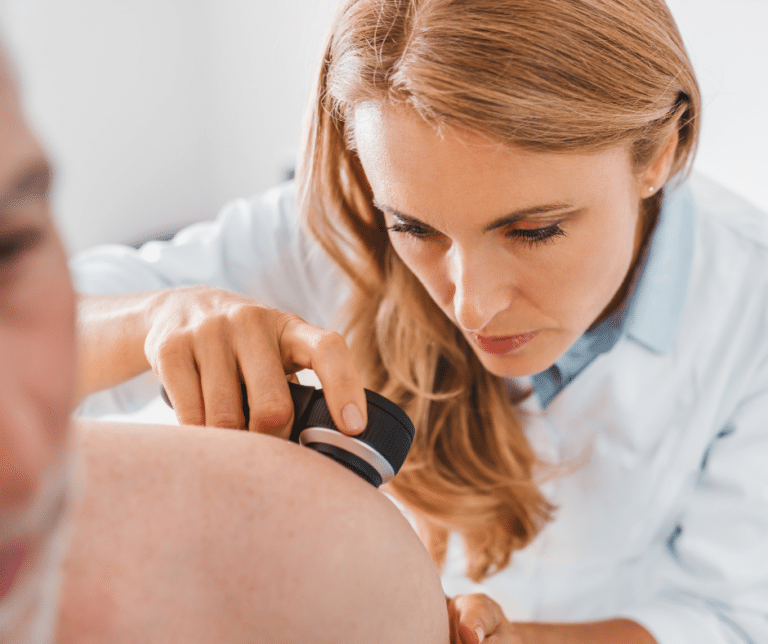Did you know that the risk of developing skin cancer increases as people age? Skin cancer is often treatable, so people don’t always think about the risks of skin cancer as much as they should. Seniors who are aging in place should be especially concerned about doing everything they can to lower their risk of skin cancer.
Often the early signs of skin cancer go undetected. Seniors who getting older may dismiss some of the early signs of skin cancer as just moles, age spots, or other harmless skin problems. Or, they may not even be aware they have symptoms of skin cancer.
Seniors should have personal care at home to help them detect symptoms of skin cancer. When seniors have personal care at home they have reliable help with tasks like showering and getting dressed. A care provider can check your senior parent for any signs of skin cancer that shouldn’t be ignored like:
Changes in Moles or Skin Lesions
The most serious sign of skin cancer that shouldn’t be ignored is a change in the size or shape of a mole or lesion on the skin. Seniors should regularly check moles for any changes, or have a care provider check for them.
Moles that have asymmetrical shapes, irregular borders, uneven colors, or diameters larger than a pencil eraser should be checked by a dermatologist. New moles or skin lesions that appear should also be looked at by a doctor.
Unusual Growth or Sores
Seniors should always pay close attention to any unusual growths, sores, or lumps on the skin that don’t heal within a few weeks. Skin cancers such as basal cell carcinoma and squamous cell carcinoma can present as persistent sores, bumps, or non-healing wounds that may bleed, ooze, or crust over.
Redness or Irritation
Skin cancers may cause redness, inflammation, or irritation on the skin that doesn’t heal with typical treatments like creams. They also may not heal even without any known triggers or allergies. Any areas of the skin that appear reddened, swollen, tender, or itchy which don’t get better in a few days or go away and reappear should be checked by a dermatologist.
Changes in Sensation
Skin cancers can sometimes cause changes in sensation in the affected area, such as pain, tenderness, itching, or tingling. Seniors should be aware of any unusual sensations on their skin, particularly in areas where moles or lesions are present, as these changes may signal the presence of skin cancer. Anytime your senior parent notices a change in the sensations they are having they should talk to their doctor.
Spread of Pigment
Melanoma, the most serious form of skin cancer, often presents as changes in the color or distribution of pigment in the skin. Look for areas where pigment spreads beyond the border of a mole or lesion, or where new pigmented areas appear on otherwise normal skin. This phenomenon, known as the “ABCDEs” of melanoma (Asymmetry, Border irregularity, Color variation, Diameter greater than 6mm, Evolution or change), can be a warning sign of melanoma.
If your senior parent has been to a dermatologist in a couple of years it’s a good idea to make an appointment for them. Seniors should see a dermatologist at least once a year to make sure there haven’t been any major changes in their skin.
If you or an aging loved one are considering Personal Care at Home in Leesburg, VA, please contact the caring staff at Access Home Care Inc today! Call (703) 765-9350
Access Home Care provider in Arlington, Alexandria, Leesburg, Reston, Herndon, Manassas, Ashburn, Falls Church, McLean, Lorton, Springfield, Woodbridge, Fairfax, Virginia and the surrounding communities.
“My desire to enter into nursing started when one of my older sisters died of kidney disease due to lack of care. At age 15, I decided to enter into nursing so that I could provide quality care to patients.Upon arrival in United States at 21 years of age, I enrolled in T.C Willliams School of Practical Nursing while working as a nursing assistant at a nursing home. I also worked as a part-time home health aide to take of the elderly. After completion of my practical nurse education, I worked in geriatric psychiatry unit at Dominion Hospital and Arlington Correctional facility mental health unit.
I completed Marymount University in 2001 and entered into Home Care as a field case manager.
I held that position for 2 years and as an Administrator, and for another 2 years until Access Home Care was found in 2004."
Today, Access Home Care has over 300 employees and 286 clients.
- Five Tips for Living with Chronic Lower Back Pain - April 3, 2025
- How 24-Hour Home Care Is Different From Other Types Of Care - March 19, 2025
- Four Symptoms of Advanced Multiple Sclerosis - March 5, 2025



